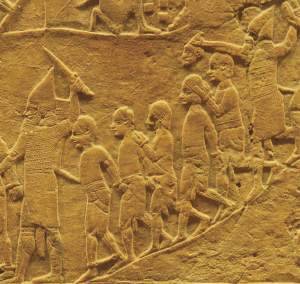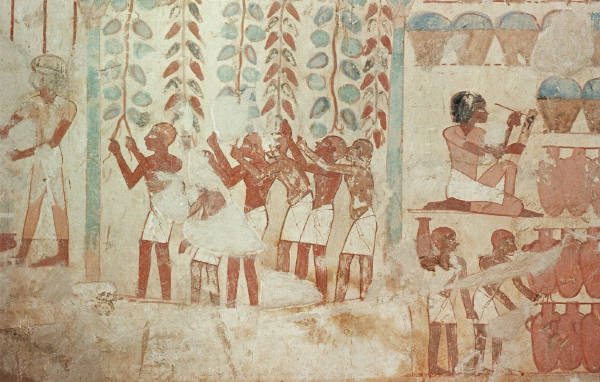A Linen Belt and Wineskins (13:1–14)
Linen belt (13:1). It is impossible to know precisely which of two kinds of loincloths is intended in this context. The first comes from a Canaanite depiction—a simple wrapper that did not pass between the legs.123 A second option is provided by an Egyptian depiction of Syrians where a garment made up of narrow strips of overlapping cloth that does pass through the legs.124 These garments could be made of different materials, such as leather, wool, or linen.

Prisoners wearing little clothing being led away by Assyrian captors
Todd Bolen/www.BiblePlaces.com
Two important aspects of this garment need to be underlined. First, this is a garment that clings to the body; it is not like a girdle worn over clothing. Second, the finest cloth mentioned here symbolizes what Israel meant to Yahweh, particularly as Israel is remembered in 2:2–4.
Go now to Perath (13:4). Generally speaking, “Perath” designates the Euphrates River in Mesopotamia. The distance between Anathoth and the Euphrates River is approximately 362 miles. This would mean two long, round-trip journeys for Jeremiah. Note that the other fifteen uses of Perath are either accompanied by the word “river” or by a qualifying term “Babylon” or “Carchemish.” This is the only place where “Perath” occurs without any qualifier.

Perath (Ein Parat)
Todd Bolen/www.BiblePlaces.com
A good alternative to the Euphrates River can be found about four miles northeast of Anathoth, at a site known as Parah, modern-day Khirbet Fara and the nearby spring Wadi Fara (cf. the Parah in Josh. 18:23). The short distance to Parah makes the symbolic action carried out by Jeremiah much more viable and powerful.
Every wineskin should be filled with wine (13:12). This is a difficult verse to interpret. There is much discussion as to whether the term for wineskin is not better translated as jar, jug, or wine flask; ample evidence exists to support this translation. However, changing the image does not solve the matter of interpretation. We suggest Jeremiah is perhaps quoting a proverb to catch the audience’s attention. He says something that really does not mean anything or is noncommunicative, and this serves to jolt the audience out of their apathy.

A detail of a painting in the tomb of Userhet shows scribes recording the jars of newly-made wine.
Werner Forman Archive